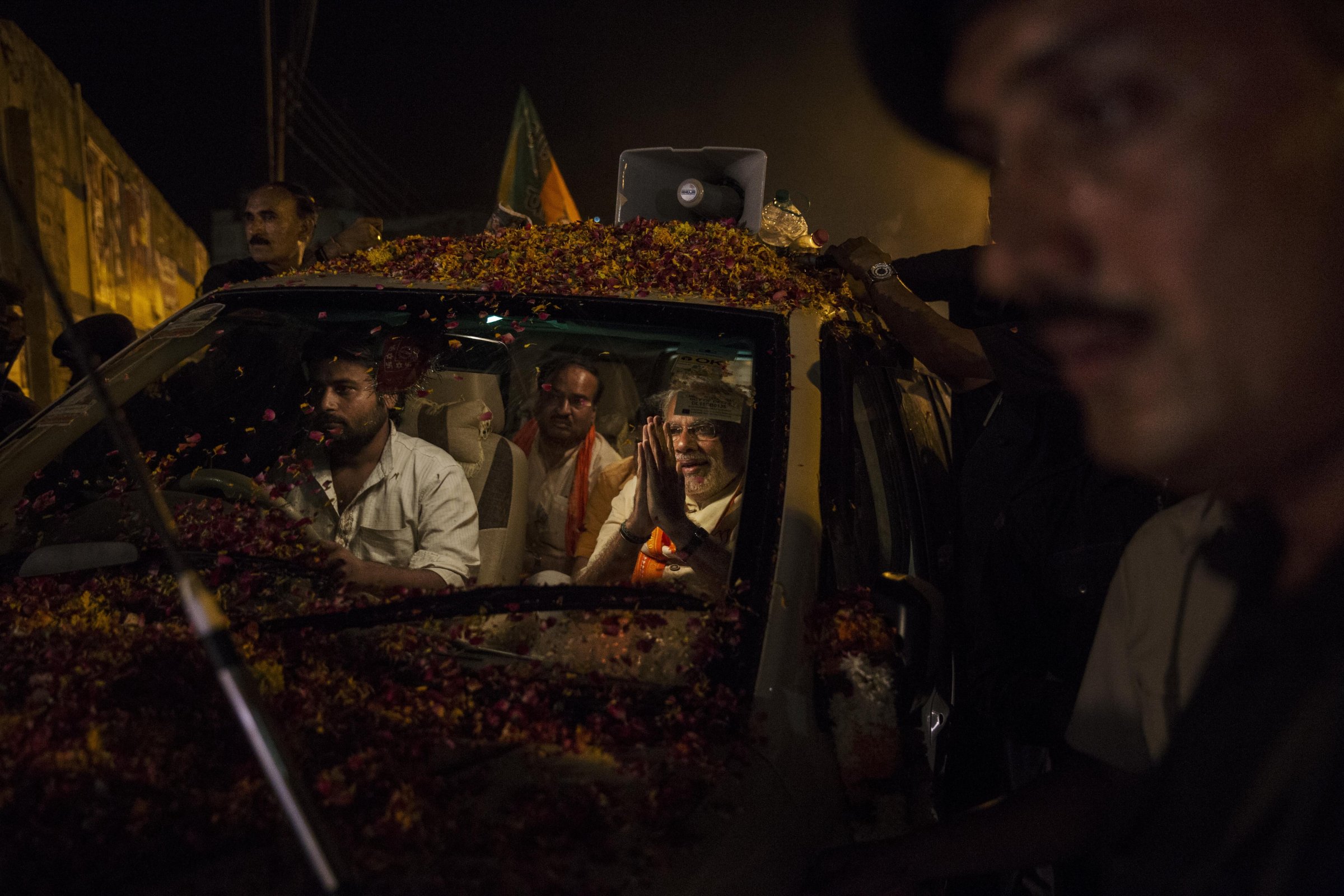
In one fell swoop, Varanasi belonged to Narendra Modi, the right-wing leader of the Bharatiya Janata Party (BJP) and soon-to-be India’s prime minister.
Varanasi, a Hindu temple town but a BJP stronghold for decades, went out of its way this time to vote for Modi, who secured a whopping 5,165,93 votes, defeating his nearest rival, Arvind Kejriwal—chief of the fairly new but fast-rising, anti-graft Aam Aadmi Party (AAP)—by more than 300,000 votes.
In 2009, BJP candidate and senior leader Murli Manohar Joshi—a sitting Member of Parliament from Varanasi who Modi had sidestepped to contest the prestigious seat himself creating a short lived flutter of dissent within the party—had won by what now appears to be a meager 17,000 votes.
Even as votes from the world’s largest election were being counted on Friday morning, Varanasi was full of posters congratulating Modi of a “historic win.” BJP workers were seen milling around in small clusters, decked up in saffron t-shirts and stoles, at the Paharia Sabzi Mandi on the outskirts of the city, where counting of votes was in progress.
Anticipation hung heavy in the air, broken momentarily by shouts of “Har Har Modi” (a take on “Har Har Mahadev” a popular Hindu slogan praising Lord Shiva that had earlier angered the people of Varanasi) slogans at the beat of drums.
The ubiquitous young supporters in dark glasses and saffron clothes zoomed around in motorbikes. LED screens blared out televised coverage of the counting of results at important intersections in the city.
Although the Indian media started reporting in the afternoon that Modi had won (possibly looking at the margin of votes with which he was leading), the final results came in only in the evening, when BJP supporters erupted in euphoric chants and slogans that later spilled over into fireworks and colors.
They smeared each other with saffron and green colors, distributed sweets and took out small victory processions. But in general, celebrations were muffled, as election Commission officials had banned victory processions in Varanasi (and throughout Uttar Pradesh, which has seen major communal riots in the recent past) after results were announced.
AAP’s Kejriwal, who reached Varanasi on Friday morning, was stoic about his defeat.
“It’s the people’s verdict,” he told TIME. “We have to accept it.”
For a new party and with much less financial clout than the BJP, the Kejriwal-led AAP had undoubtedly put up a laudable fight against the indomitable Modi wave that had engulfed most of India in elections 2014. Kejriwal had walked away with 1,79,739 of the votes, relegating the Congress party’s Ajay Rai, local strongman, to the third position.
“Tough luck for AAP. We keep talking about change but when it comes to bringing it in, we shy away,” says Aloke Thakur, a small trader, looking disappointed as the results were announced.
Modi is expected to be in Varanasi on Saturday evening to celebrate his and his party’s win with a Ganga Aaarti—an invocation of the river Ganges—a grand evening ritual that attracts people from all over the world to the shores of the river Ganges in Varanasi.
“We are happy Modi won, he has said he will transform Varanasi in one year,” says Dipu Majhi, a first time voter, who voted for the BJP. “Let’s see what he does.”
Golu Sahni, another first time voter says, “If not, then we can always change our mind after five years.”
More Must-Reads from TIME
- Why Biden Dropped Out
- Ukraine’s Plan to Survive Trump
- The Rise of a New Kind of Parenting Guru
- The Chaos and Commotion of the RNC in Photos
- Why We All Have a Stake in Twisters’ Success
- 8 Eating Habits That Actually Improve Your Sleep
- Welcome to the Noah Lyles Olympics
- Get Our Paris Olympics Newsletter in Your Inbox
Contact us at letters@time.com